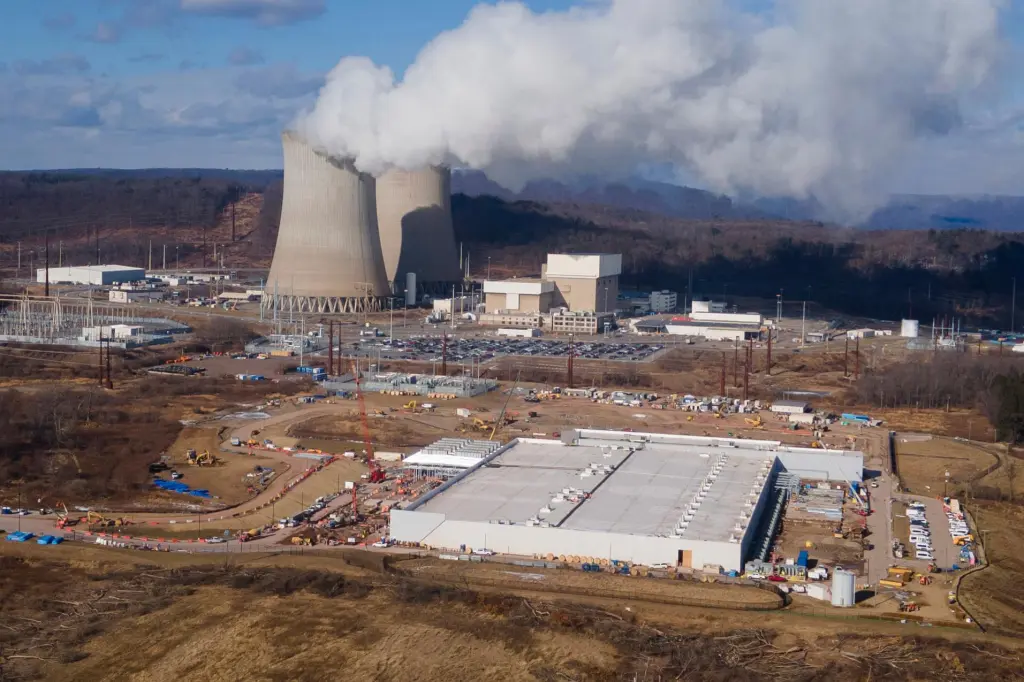
If you fly out of Dulles International Airport, there’s one thing you’ll notice down below: data centers.
Those massive, brutalist structures play a major role in our modern economy and daily use of technology. If you have ever streamed a movie, scrolled through a social media feed or used a navigation app, you’ve relied on a data center. Data centers contain servers and other technical hardware that specialize in storing, processing and managing data and applications for various organizations. While they are easy to ignore, data centers are the infrastructure powering nearly every digital interaction we encounter today.
Northern Virginia is peppered with numerous data centers, with a particularly dense cluster in Loudoun County. This region hosts the highest concentration of data centers on the planet and is often referred to as the “data center capital of the world” or simply Data Center Alley.
Large tech companies continue to invest in the expansion of data centers in this region because of its well-developed fiber optic network, business-friendly environment and relatively stable climate. With substantial investments from Microsoft, Amazon, Google and others, Data Center Alley’s capacity is expected to more than double by 2040. Loudoun County currently has roughly 37 million square feet of operating data center space, and 42 million square feet has been proposed.
While this growth will certainly increase tax revenues for the area, local residents have expressed concerns about the implications for their communities. A “not-in-my-backyard” sentiment has spread in response to the extensive overhead power lines, the hum of cooling fans, or the hulking buildings themselves, which have literally been built in lots adjacent to some residents’ backyards.
So why the sudden expansion of data centers? They have become increasingly important with the rise in use of artificial intelligence. For AI to be effective, it must first be trained on enormous amounts of data. This requires data storage and processing, as well as the computing power that data centers offer. Once it is trained, AI must then make inferences based on provided prompts, which requires it to run models that can recognize patterns, make predictions and provide sensible outputs. The whole AI process, from creation to end-user interactions, relies heavily on the services provided by data centers.
AI and the application of machine learning (a subset of AI) are not new; however, the general use of AI has grown exponentially since the release of OpenAI’s ChatGPT in 2022. Considering the growing number of AI tools and use-cases across various fields, this trend is not likely to slow down any time soon. Even those who do not use AI directly will continue to see more AI infused into their daily lives in the digital world. As a result, the rise of AI is fueling a surge in demand for data center capacity, not only in Virginia but around the world.
Data centers consume significant amounts of electricity to operate. Reuters reports that the more than 200 data centers that comprise Data Center Alley consume roughly the same amount of electricity as the city of Boston. The added load from AI is increasing data centers’ energy consumption even higher. AI companies are reluctant to disclose how much energy training their models and various types of prompts consume; however, researchers estimate that, on average, a generative AI prompt consumes 10 to 100 times more electricity than a typical internet search query.
And it’s not just electricity that AI is consuming. Fresh water is commonly used in intricate tubing to cool processing chips. Data centers using this temperature control method are projected to use up to 1.7 trillion gallons of water annually by 2027.
The energy demand of data centers and AI has already created issues with local power grids as utility companies struggle to supply sufficient electricity. In March, 60 data centers in Virginia suddenly lost power, forcing them to switch to on-site generators. Dominion Energy is set to break ground on a new natural gas power plant in Chesterfield by 2026 to support the increased demand. While some data centers use renewable energy, many still draw power from fossil fuels.
Due to the energy sources and consumption rate of data centers powering the use of AI, their carbon footprint and environmental sustainability impact are major concerns. Addressing these concerns is particularly important for organizations working toward ambitious sustainability goals that many set in the past decade. Robert Blue, CEO of Dominion Energy, recently acknowledged this tension between the energy demands of AI and sustainability goals in an interview with the Wall Street Journal. After stating with confidence that the company will still achieve “net-zero (carbon emissions) by 2050,” he said, “But the demand growth now makes that more complicated.”
Solutions will require a systems-thinking approach and collaboration among stakeholders. Utilities and other companies have invested in modernizing the power grid with updated infrastructure. Nvidia, a market-leading company that makes hardware used in many data centers, is working to improve the energy efficiency of its networking chips and processors. Those that rely heavily on the internal use and productization of AI are striving to improve the efficiency of their models. And tech giants such as Microsoft, Google, Amazon and Meta have announced major projects to power their data centers with nuclear power to avoid the emissions of fossil fuel power sources.
Data centers are enabling a more connected world with access to incredible AI tools. These tools have already created value in many fields, including health care, education and transportation. The promising transformational potential of AI continues to increase as the models improve. With this progress comes a responsibility to ensure that the negative effects of this innovation are mitigated as much as possible. As the home of Data Center Alley, Virginia and its residents will continue to play an important role in the modern digital age. In this world now marked by the rise of AI, we should embrace its potential, but not without staying informed and choosing when and how we use it wisely.
Conner Blake, Ph.D., is an assistant professor of accounting at Christopher Newport University. Joseph Falcone is an undergraduate CNU student majoring in accounting.



